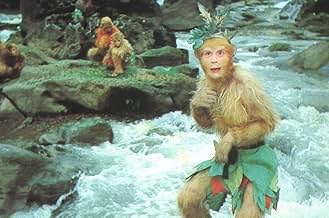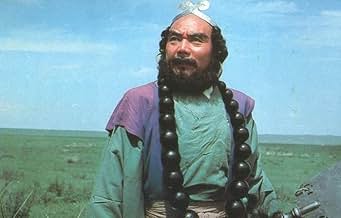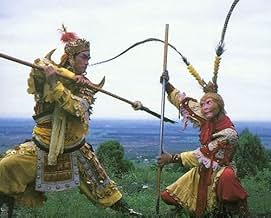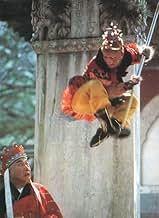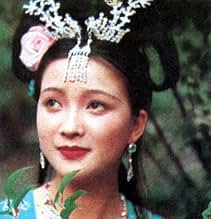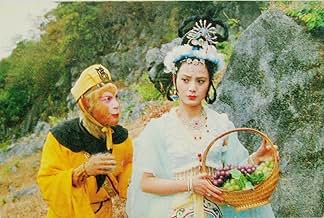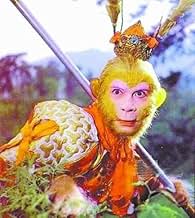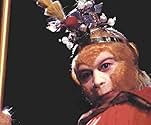Participez au long pèlerinage légendaire du moine bouddhiste de la dynastie Tang, Tang Shen, qui s'est rendu dans les régions occidentales de l'Asie centrale et de l'Inde pour obtenir des te... Tout lireParticipez au long pèlerinage légendaire du moine bouddhiste de la dynastie Tang, Tang Shen, qui s'est rendu dans les régions occidentales de l'Asie centrale et de l'Inde pour obtenir des textes bouddhistes sacrés.Participez au long pèlerinage légendaire du moine bouddhiste de la dynastie Tang, Tang Shen, qui s'est rendu dans les régions occidentales de l'Asie centrale et de l'Inde pour obtenir des textes bouddhistes sacrés.
- Récompenses
- 6 victoires au total
Parcourir les épisodes
Avis à la une
10vp-68182
**Review of "Journey to the West" (1986)**
"Journey to the West" (1986) is a legendary Chinese television series that brings the classic novel by Wu Cheng'en to life with remarkable accuracy and charm. This series has left an indelible mark on the hearts of viewers, transcending generations and becoming a cultural icon in China and beyond.
The show follows the epic journey of the monk Tang Sanzang and his three disciples-Sun Wukong (the Monkey King), Zhu Bajie (Pigsy), and Sha Wujing (Sandy)-as they travel westward in search of Buddhist scriptures. Along the way, they encounter numerous trials, demons, and temptations, all while showcasing themes of loyalty, perseverance, and the struggle between good and evil.
One of the most notable aspects of this series is its faithful adherence to the original text. The show's creators managed to capture the essence of the novel, retaining its humor, moral lessons, and mythological elements. The performances, particularly by Liu Xiao Ling Tong as Sun Wukong, are unforgettable. Liu's portrayal of the mischievous yet righteous Monkey King is widely regarded as one of the best in television history.
The special effects, while primitive by today's standards, were groundbreaking at the time and added a layer of magic to the show. The vivid costumes, elaborate set designs, and traditional Chinese music further immerse the audience in the world of ancient mythology.
What makes "Journey to the West" (1986) truly special is its ability to appeal to audiences of all ages. Children are captivated by the action and fantasy, while adults appreciate the deeper philosophical and cultural themes. It is a show that entertains while also offering profound insights into Chinese culture and spirituality.
In conclusion, "Journey to the West" (1986) is a timeless masterpiece that stands as one of the greatest adaptations of Chinese literature. Its enduring popularity is a testament to its quality, and it remains a must-watch for anyone interested in Chinese culture, mythology, or classic television.
"Journey to the West" (1986) is a legendary Chinese television series that brings the classic novel by Wu Cheng'en to life with remarkable accuracy and charm. This series has left an indelible mark on the hearts of viewers, transcending generations and becoming a cultural icon in China and beyond.
The show follows the epic journey of the monk Tang Sanzang and his three disciples-Sun Wukong (the Monkey King), Zhu Bajie (Pigsy), and Sha Wujing (Sandy)-as they travel westward in search of Buddhist scriptures. Along the way, they encounter numerous trials, demons, and temptations, all while showcasing themes of loyalty, perseverance, and the struggle between good and evil.
One of the most notable aspects of this series is its faithful adherence to the original text. The show's creators managed to capture the essence of the novel, retaining its humor, moral lessons, and mythological elements. The performances, particularly by Liu Xiao Ling Tong as Sun Wukong, are unforgettable. Liu's portrayal of the mischievous yet righteous Monkey King is widely regarded as one of the best in television history.
The special effects, while primitive by today's standards, were groundbreaking at the time and added a layer of magic to the show. The vivid costumes, elaborate set designs, and traditional Chinese music further immerse the audience in the world of ancient mythology.
What makes "Journey to the West" (1986) truly special is its ability to appeal to audiences of all ages. Children are captivated by the action and fantasy, while adults appreciate the deeper philosophical and cultural themes. It is a show that entertains while also offering profound insights into Chinese culture and spirituality.
In conclusion, "Journey to the West" (1986) is a timeless masterpiece that stands as one of the greatest adaptations of Chinese literature. Its enduring popularity is a testament to its quality, and it remains a must-watch for anyone interested in Chinese culture, mythology, or classic television.
A whole sky of childhood.
Film is both thrilling, philosophical, and witty.
Each episode is a vivid story.
Actors are more than amazing.
Create the standard character image.
Magnificent view.
Profound dialogue.
"It is not known whether the Bodhisattva became a Youkai or the Youkai turned into a Bodhisattva."
Each view is very interesting.
If you enter Journey to the West, you will get two financially successful films that were made several years after this one. Those films are junk; Hollywood-imitation garbage by talentless Chinese producers who care nothing about the real history and culture of China. They are out to just make a buck by exploiting perhaps one of the most courageous Buddhist practitioners in Chinese history. The Upanishads were actually the foundation of these sutras, but that small fact is basically irrelevant; the film is about faith, and the strength it gives the true believer. I am not a Buddhist or a religious individual (Philosophical Taoist), but I value the actions of those who live out the true values of their various religions by performing acts of kindness and humanity. This is one of those films. Remember, see the 1986 version of the film.
This is a classic TV series, is the adaptation of Chinese classical classics, the myth of the world is very exciting
Even though this series is very old, but everyone in every age is watching this. It's tradition with family.
I like the pig very much, he is very funny and cute.
I like the pig very much, he is very funny and cute.
Le saviez-vous
- ConnexionsReferenced in Tang ren jie tan an 2 (2018)
Meilleurs choix
Connectez-vous pour évaluer et suivre la liste de favoris afin de recevoir des recommandations personnalisées
- How many seasons does Journey to the West have?Alimenté par Alexa
Détails
Contribuer à cette page
Suggérer une modification ou ajouter du contenu manquant

